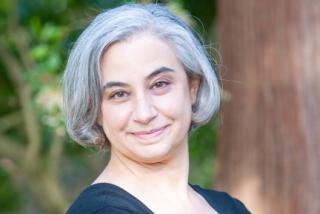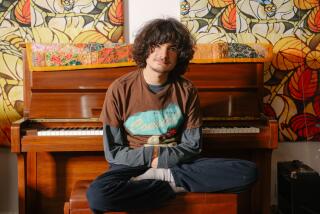When the Biggest Gift Is a Little Boyâs Hug
No two people with autism are the same; its precise form or expression is different in every case . . . So, while a single glance may suffice for clinical diagnosis, if we hope to understand the autistic individual, nothing less than a total biography will do. --Oliver Sacks, âAn Anthropologist on Marsâ
My son Francisco Manuel--or Frankie as everyone calls him--is 3 years old, so writing his âtotal biographyâ shouldnât be as hard for me as it is. What makes it difficult is trying to write with a leaden pain in my heart.
It has been a year since we learned that Frankie has autism. Or, to use the proper terminology that Sacks and the many kind, caring medical specialists I have come to know this year use, he is âchallenged by infantile autism.â
I have avoided writing about him until now. Not just because it is painful, but because I was trying to fully comprehend what autism is, and what challenges it will pose for Frankie and the rest of our family for as long as he lives.
In simplest terms, autism is a neurological condition that makes it difficult to differentiate among the many sensory stimuli, like touch, light and sound--an ability that other people take for granted. For people with autism, exposure to such stimuli can result in âsensory overload,â which they respond to by shutting out the world and withdrawing into themselves.
Of course, Iâm still working on the intellectual part of understanding autism. Iâm good at that. Years of journalistic training and practice have taught me to step back from even the most complex and emotion-laden topics and to analyze them dispassionately. So Iâve spent a lot of time researching autism--reading everything from clinical tracts to propaganda for purported miracle cures to the wonderfully written and hopeful book quoted above, which was published earlier this year.
I would not have learned nearly as much as I have without the similarly disciplined research skills of my wife Magdalena, a former reporter at the Orange County Register. But there are times when our disciplined teamwork wavers, and either Magdalena or I cannot be coolly focused. Thatâs when the sorrow rises to the surface. Then all we can do is dwell on our hopes and fears for a little boy with a soft, sweet smile and big brown eyes that normally sparkle with joy but sometimes glaze over in a distant stare as he is momentarily lost to us. When that happens, Frankie is experiencing sensory overload. Then he will hum monotonously and rapidly rub his hands together while pacing back and forth.
Those are among the most common symptoms of infantile autism. They are the behaviors that a year ago led us to consult pediatric specialists to try to determine why after two years of normal development, Frankie had stopped speaking and was slurring the few words he would say.
The initial diagnosis was made in early January by Dr. Nancy Brill, a pediatric behavior specialist at Kaiser Permanente, where Magdalena works as a communications director. For the next three months, Frankie underwent a series of comprehensive medical tests, some long and painful, to rule out other possibilities, including brain tumors or epilepsy. All the tests were negative. We later got a second opinion from Dr. B.J. Freeman, a noted autism researcher at UCLA.
Like Brill, Freeman concluded that Frankieâs autism was mild and, with sufficient early intervention therapy, his prognosis was hopeful. He could look forward to an education and productive adulthood--perhaps even a creative one, if the remarkable people Sacks profiles in his book are potential models.
Sometimes, when the insurance paperwork mounts, or weâre stuck in traffic while trying to rush Frankie to one of his many therapy appointments, that hopeful prognosis is all we have to keep us going.
It has been especially tough this holiday season--the first in which we have been not just aware that something was troubling Frankie, but acutely aware of exactly what it was. It has been such a difficult time that I found myself avoiding holiday parties, and decided I was in no mood to send out Christmas cards. I couldnât even bring myself to help Magdalena trim our Christmas tree. I concentrated on Frankie instead, playing with him and trying to keep him focused on Christmas books and songs. He sings a pretty fair âFrosty the Snowman.â
Thatâs a good sign, of course. The therapies are helping. Frankie is speaking again, even if many words still are slurred. With encouragement and guidance from a skilled behavior therapist and the caregivers at his preschool, he is beginning to play with other children. Thatâs a breakthrough, since a symptom of classic autism is a tendency to withdraw from contact with people. Some persons with autism literally cannot tolerate being touched.
Of all the things Iâve learned this year, that is the one that both frightens and reassures me. It frightens me to think my son would ever shy away from my touch. And it reassures me because it suggests that Sacksâ conclusion is correct, and that every individual with autism is unique. Which means that somewhere, somehow, Frankie can find his niche.
Thankfully, Frankie not only allows us to touch him, he enjoys it. Although he is well past the toddler stage, he cuddles like a newborn infant. I now treasure that physical warmth in a way I might never have if he were ânormal.â Iâm counting on it to help me get through the holidays and a new year of new challenges for Frankie.
More to Read
Sign up for our Book Club newsletter
Get the latest news, events and more from the Los Angeles Times Book Club, and help us get L.A. reading and talking.
You may occasionally receive promotional content from the Los Angeles Times.







